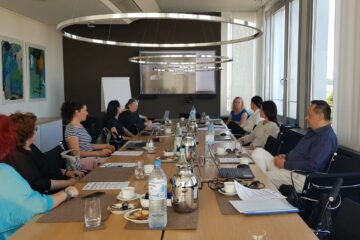The ADDET project aims to develop of problem solving skills of apprentices and VET students through the application of Design thinking methodology. In order to test and validate the developed apprenticeship model, focus groups took place in all partner countries. The participants were different types of apprenticeship experts such as stakeholders, VET trainers and company trainers who should be invited to participate.
In Germany the focus group meeting took place in November 2021 and eight experts from different companies and schools participated at the event and gave their suggestions and advices for the development of the apprenticeship model.
At the beginning of the focus group meeting, there was a brief introduction of the ADDET project and an overview of the current project status. The key issues in the debate were:
- Is the Design Thinking method applicable for the dual system of vocational education in Germany?
- What is the expert’s opinion about the importance of the use of the Design Thinking method for the development of problem-solving skills among apprentices?
- What are the challenges in applying the Design Thinking method in vocational training?
- Is the design thinking methodology already being used in vocational training? How is the method implemented?
- What additional competences can apprentices and VET students develop further by using the Design Thinking method?
- What competences do trainers need? And what kind of competences or skills must be trained among the training staff in vocational schools?
From a business perspective several companies cannot imagine to implement the Design thinking methodology currently, because they fear that it would require too much human resources.
But they saw the possibility to insert selected aspects of the methodology first to integrate into the daily routine of the company like team work or develop ideas etc. Another possible solution could be the implementation of the apprenticeship model in companies first who can already provide the resources. This of course requires also an entrepreneurial interest of the company. Companies with the structure already in place could also realise pilot projects as so called flagship projects. The company representatives saw another critical point considering the apprenticeship model. The size of the proposed project teams with up to 5 trainees is to big, especially if there are fewer trainees in the company.
As a result each company has to define their own goals first and what can actually be implemented. In terms to vocational training in Germany it seems possible to apply the design thinking method in different areas of vocational training. It is important to determine this method for target groups and to consider how this method can be implemented in the framework curricula.
The company representatives added one point more that needs to be considered, the self-efficacy or self-effectiveness of the students. In the current apprenticeship model, they are not empowered and encouraged to implement their ideas at the school and in apprenticeship.
They advised that it is important to look for small group approaches to implement the apprenticeship model among trainers and teaching staff. Small steps are essential here. The experts confirmed that the result must be an apprenticeship model including a guide for trainers and a guide for companies. Competences should be precisely defined and it has be clear which ones of them should to be trained.
The approach according design thinking emphasizes on human abilities and is an effective approach for making changes. The companies were very open to this approach overall and consider it a challenging goal to implement the method in the future vocational training in Germany.


